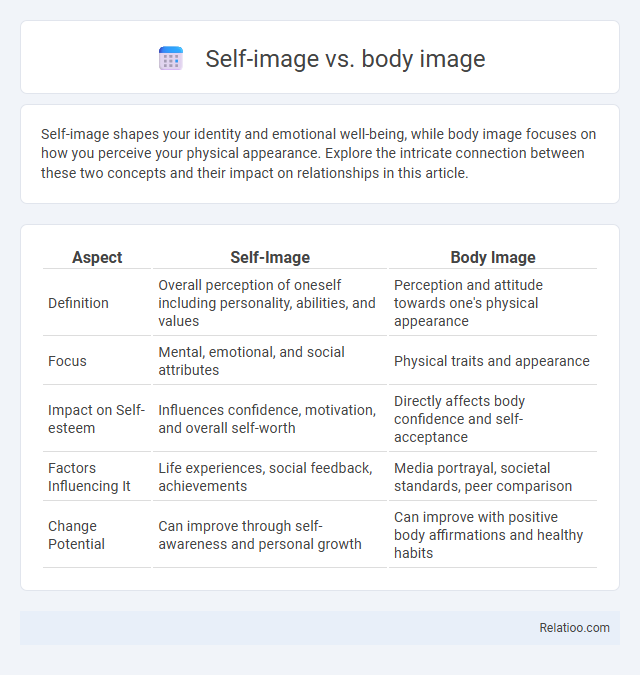Self-image shapes your identity and emotional well-being, while body image focuses on how you perceive your physical appearance. Explore the intricate connection between these two concepts and their impact on relationships in this article.
Table of Comparison
| Aspect | Self-Image | Body Image |
|---|---|---|
| Definition | Overall perception of oneself including personality, abilities, and values | Perception and attitude towards one's physical appearance |
| Focus | Mental, emotional, and social attributes | Physical traits and appearance |
| Impact on Self-esteem | Influences confidence, motivation, and overall self-worth | Directly affects body confidence and self-acceptance |
| Factors Influencing It | Life experiences, social feedback, achievements | Media portrayal, societal standards, peer comparison |
| Change Potential | Can improve through self-awareness and personal growth | Can improve with positive body affirmations and healthy habits |
Understanding Self-Image and Body Image
Understanding self-image involves recognizing how you perceive your overall identity, including personality traits, beliefs, and values, while body image specifically relates to your perceptions and attitudes toward your physical appearance. Both constructs significantly impact mental health and self-esteem, influencing how you interact socially and your emotional well-being. Cultivating a positive self-image requires addressing distorted body image perceptions and embracing a holistic view of yourself beyond physical attributes.
The Psychological Roots of Self-Image
Self-image originates from the psychological interaction between self-perception and external feedback, deeply influencing self-esteem and mental well-being. Unlike body image, which specifically addresses physical appearance and how individuals perceive their bodies, self-image encompasses broader cognitive and emotional frameworks including abilities, personality traits, and social roles. Understanding the psychological roots of self-image reveals how early experiences, internalized beliefs, and social comparisons shape one's overall self-concept and identity stability.
How Body Image Shapes Our Daily Lives
Body image significantly influences daily behaviors, affecting choices related to diet, exercise, and social interactions by shaping how individuals perceive their physical appearance. Unlike general self-image, which encompasses broader self-perceptions including skills and personality traits, body image specifically centers on one's attitudes and feelings toward their own body. Understanding the impact of body image is crucial for promoting mental health, as negative body perceptions can lead to issues like low self-esteem, anxiety, and unhealthy coping mechanisms.
Media Influence on Self and Body Perception
Media influence significantly shapes self-image and body image by presenting idealized and often unrealistic standards of appearance, leading individuals to internalize these portrayals as benchmarks for self-worth. Constant exposure to edited and curated images on social platforms alters perception, causing dissatisfaction and distorted body image, especially among adolescents. Understanding the distinction between self-image, which encompasses overall self-perception including values and abilities, and body image, which specifically relates to physical appearance, is crucial in addressing the psychological impact of media consumption.
Cultural Factors Affecting Body and Self-Image
Cultural factors significantly shape both body image and self-image by influencing societal standards of beauty and self-worth, often perpetuating ideals that can impact Your mental health and self-perception. Media representations, cultural norms, and community values contribute to how individuals internalize their physical appearance and personal identity, which may lead to disparities between actual and idealized self-images. Understanding these cultural influences is crucial for addressing body dissatisfaction and fostering a positive self-image in diverse populations.
The Impact of Social Comparison
Social comparison significantly influences self-image, body image, and self-esteem, often leading to distorted perceptions based on societal standards. Exposure to curated images on social media can cause You to internalize unrealistic ideals, affecting your confidence and mental health. Understanding this impact helps in fostering a healthier self-image by focusing on personal strengths rather than external comparisons.
Self-Esteem: Linking Self-Image and Body Image
Your self-esteem is deeply influenced by the interaction between self-image and body image, where self-image encompasses your overall perception of yourself beyond physical appearance, and body image specifically relates to how you view your physical body. Positive body image can enhance self-esteem by fostering acceptance and appreciation of your unique features, while negative body image often leads to diminished self-worth and emotional distress. Improving self-esteem involves cultivating a balanced self-image that integrates both internal qualities and external appearance, allowing you to build confidence and resilience.
Overcoming Negative Body Image
Overcoming negative body image involves recognizing the distinction between self-image, which encompasses overall self-perception and self-worth, and body image, the specific mental representation of one's physical appearance. Strategies such as cognitive-behavioral therapy, mindfulness, and positive affirmations help reshape distorted body images and promote a healthier self-image. Improved self-esteem and body acceptance contribute significantly to mental well-being and reduce the impact of societal pressures on appearance.
Building a Healthy Self-Image
Building a healthy self-image involves cultivating a positive perception of oneself that goes beyond physical appearance, integrating emotional, mental, and social aspects. While body image focuses specifically on how one views their physical form, self-image encompasses the broader sense of identity and personal worth. Emphasizing self-acceptance, realistic goal-setting, and mindful self-reflection strengthens overall well-being and resilience against external judgments.
Strategies for Positive Self and Body Acceptance
Positive self and body acceptance can be cultivated by focusing on self-compassion, challenging negative thoughts, and embracing your unique qualities and strengths. Mindfulness practices and limiting exposure to unrealistic media portrayals help improve both self-image and body image, fostering a balanced view of yourself. Developing gratitude for what your body allows you to do encourages lasting confidence and healthier mental well-being.

Infographic: Self-image vs Body image
 relatioo.com
relatioo.com